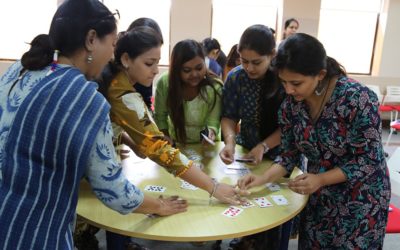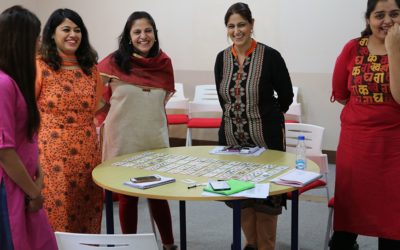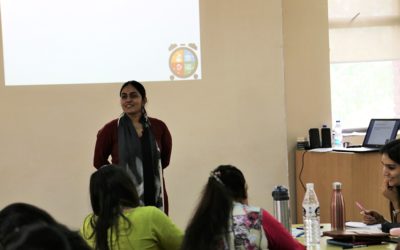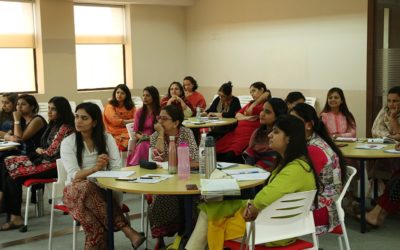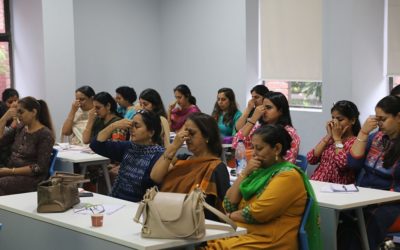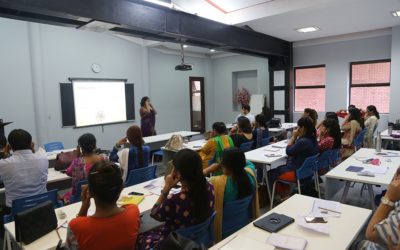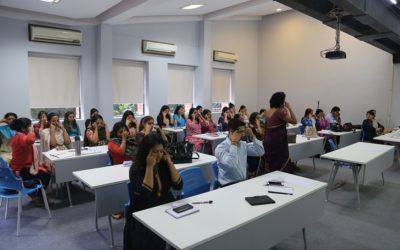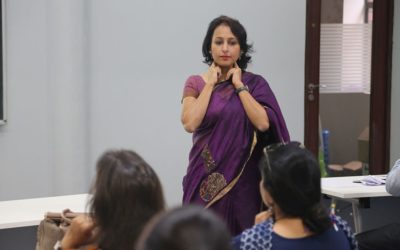The Centre for Teaching, Research, and Learning (CTRL) was established with the aim of fostering educational excellence, advancing scholarly inquiry, and supporting a culture of lifelong learning. It serves as a hub for innovative pedagogy, cutting-edge research, and continuous professional development for educators and researchers. With a commitment to enhancing the quality of education and contributing to the advancement of knowledge, CTRL plays a pivotal role in promoting a dynamic and thriving academic community.

VISION & MISSION
Vision: The Centre for Teaching, Research, and Learning (CTRL) envisions a future where education is a transformative force, research is a catalyst for innovation, and learning is a lifelong journey.
Mission: CTRL is dedicated to advancing the art of teaching, the frontiers of research, and the joy of learning.
OBJECTIVES AND ACTIVITIES
Undertake and promote research and attract students of the highest calibre to the Law’s Enhance Teaching Excellence: Improve the quality of education by providing faculty with tools, strategies, and professional development opportunities to enhance their teaching skills and effectiveness.
- Support and promote research endeavours by offering grants, resources, and a collaborative environment to help faculty and students advance their scholarly work.
- Encourage interdisciplinary research and teaching initiatives that foster innovation and provide a holistic perspective on complex issues.
- Create a learning ecosystem that extends beyond the classroom, where individuals are motivated to pursue lifelong learning, both in and outside their academic and professional pursuits.
- Ensure that teaching and research activities are inclusive and representative of diverse perspectives, backgrounds, and experiences.
- Assist educators in incorporating and leveraging technology to enhance teaching and learning experiences.
Activities of CTRL
- Conduct workshops, seminars, and training sessions for faculty to improve teaching techniques and incorporate innovative pedagogical methods.
- Administer grants and research funding opportunities to support faculty and student research projects, enabling them to pursue their academic inquiries.
- Organize conferences, symposia, and discussion panels to encourage collaboration between departments and disciplines.
- Offer a variety of courses, seminars, and online resources for ongoing education and skill development for faculty, students, and the wider community.
- Collaborate with educators to create curricula that reflect diverse perspectives and promote inclusivity, equity, and accessibility in education.
- Establish partnerships with local communities, organizations, and industry stakeholders to facilitate real-world learning experiences and research opportunities for students and faculty.
- Offer mentoring and support programs for faculty and students, connecting experienced educators with those seeking guidance and mentorship.
- Provide access to an extensive library, research databases, and academic resources to support both teaching and research activities.Through these objectives and activities, the Centre for Teaching, Research, and Learning aims to create a dynamic and supportive environment that empowers educators, researchers, and learners to thrive and make significant contributions to the academic and broader community.
CENTRE HEAD
ADVISORY BOARD MEMBERS
The Centre works under the supervision of –
- Prof. Sujata Shahi, Vice-Chancellor IILM University, Gurugram
- Prof. Arvind Chaturvedi, Pro Vice-Chancellor IILM University, Gurugram
- Prof. Hima Gupta, Professor, Director Training IILM University, Gurugram
- Prof. Manisha Joshi, Dean SOM, IILM University, Gurugram
- Prof. Tripti Toor, Associate Professor, SOM, IILM University, Gurugram
- Prof. Saima Rizvi, Professor, IILM University, Gurugram
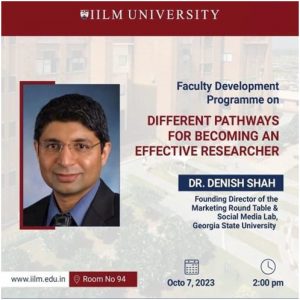 Professor Denish Shah from the United States as our distinguished guest speaker for the FDP on “Different Pathways for becoming an effective researcher” on 7th October 2023. Dr. Shah is the Barbara and Elmer Sunday Professor and Associate Professor of Marketing, Founding Director of the Social Media Intelligence Lab, and Executive Director of the Marketing RoundTable at Georgia State University.(Profile – https://www.denishshah.com/index.html).
Professor Denish Shah from the United States as our distinguished guest speaker for the FDP on “Different Pathways for becoming an effective researcher” on 7th October 2023. Dr. Shah is the Barbara and Elmer Sunday Professor and Associate Professor of Marketing, Founding Director of the Social Media Intelligence Lab, and Executive Director of the Marketing RoundTable at Georgia State University.(Profile – https://www.denishshah.com/index.html).
Dr. Shah has covered a wide range of topics essential for faculty members and researchers focusing on multidisciplinary research, including:
- Identifying and Navigating Different Research Pathways
- Effective Strategies for Publishing Research
- Balancing Teaching and Research Responsibilities
- Leveraging Collaborative Opportunities
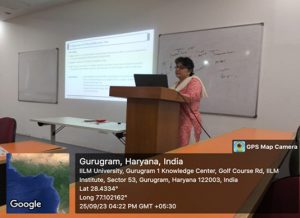 FDP on Bibliometric Analysis through VOS Viewer was organized at IILM University on 25th September 2023. The speaker Dr. Pallavi Mehrotra has guided the participants on utilizing the Biliometric data through VOS Viewer for literature review.
FDP on Bibliometric Analysis through VOS Viewer was organized at IILM University on 25th September 2023. The speaker Dr. Pallavi Mehrotra has guided the participants on utilizing the Biliometric data through VOS Viewer for literature review.
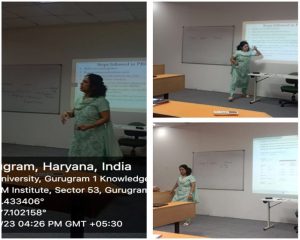 On September 4, 2023, Dr. Hima Gupta led an engaging session aimed at enriching the research competencies of our participants towards Systematic reviews through PRISMA. PRISMA (Preferred Reporting Items for Systematic Reviews and Meta-Analyses) serves as an invaluable instrument for their proficient execution.
On September 4, 2023, Dr. Hima Gupta led an engaging session aimed at enriching the research competencies of our participants towards Systematic reviews through PRISMA. PRISMA (Preferred Reporting Items for Systematic Reviews and Meta-Analyses) serves as an invaluable instrument for their proficient execution.
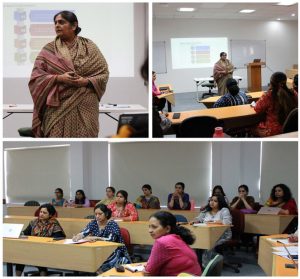 FDP on “Concepts and Implementation of NEP” by Prof. Sujata Shahi, Vice Chancellor, IILM University on 21st August 2023. This education policy is dedicated to the well-being of students, making learning an enjoyable and student-centric experience.
FDP on “Concepts and Implementation of NEP” by Prof. Sujata Shahi, Vice Chancellor, IILM University on 21st August 2023. This education policy is dedicated to the well-being of students, making learning an enjoyable and student-centric experience.
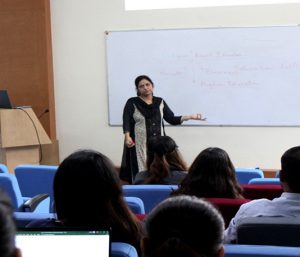 FDP on Outcome based education was conducted by Dr. Hima Gupta on 5th November 2022.
FDP on Outcome based education was conducted by Dr. Hima Gupta on 5th November 2022.
All the participants had got an understanding of course outcome and program outcome calculation and alignment of program objective vis a vis the attainment of course outcome.
Classroom Management, Pedagogy and Well-being in Schools
An Online Workshop with Banyan Tree Teachers
On 23 May 2022
10.00hrs-13.00hrs
10.00-10.10am: Introduction by Rucche Sharrma, Vice-principal, Banyan Tree, Lodhi Road.
10.10-10.15am: Introduction to the workshop.
10.15-11.15am: Activity Based Learning: Different Perspectives by Professor Rahul Mishra, IILM, Lodhi Road.
11.15am-12.15pm: It’s OK Not to be OK: Managing Emotions and Well-being Post Covid Professor Preeti Kapoor, IILM University, Gurugram.
12.15-12.50pm: Reflections and Response by Dr. Anamika, IILM University, Gurugram.
12.50pm: Vote of Thanks by Ms. Deboleena Chowdhuri, Director, Banyan Tree School.
Convenor:
Dr. Anamika
Associate Professor
IILM University, Gurugram
The session was conducted by Advocate and activist, Ms Suroor Mander, who has a distinguished career focused on international law and human rights issues. Born in Lucknow in 1985, she completed her studies in Bangalore University and the UN-Mandated University for Peace, Costa Rica. During this period, she worked as a legal practitioner in the Trial and High courts of Delhi and co-authored a report titled ‘Accountability for Mass Violence: Examining the State’s Record’ in 2011, for the Centre for Equity Studies, Delhi. She has recently co-authored a report with Mohsin Alam Bhat titled “Purgatory in Kashmir” about the implementation of Juvenile Justice in the Kashmir Valley. Notable achievements in her career so far have been the drafting of the National Food Security Bill for the National Advisory Council, UPA. Ms. Mander is currently the founder of the Parwaaz Project, affiliated with the Aman Biradari Trust that works on bridging legal and social needs to youth in conflict with law. She is also a consultant for child rights and child protection issues in various social organizations namely, Emmanuel Hospital Association, Centre for Equity Studies, and the Association for Rural and Urban Needy.
The session was on building Citizenship Awareness among School children. She started the session by briefly discussion the role of constitution and the Preamble in this aspect. The workshop was based on generating a discussion about what educators can do to build a sense of social and civic belonging among urban children (often privileged). She discussed the role of schools as to how they could contribute and sensitize the students towards working for the not so privileged. During her session, she brought about examples of schools in NCR who were working towards this. Another important objective of the workshop was to highlight some basic laws which even teachers themselves may not be so informed about. The session was attended by about 40 teachers and this topic generated a lot of discussion and participation.
The session was conducted by Prof Rahul Mishra, who teaches PG and UG courses in the area of Strategy, International Business and General Management at IILM Institute for Higher Education. He has completed his Masters in International Business from Delhi University and has 21 years of experience in teaching training and academic administration. He regularly conducts training for middle to senior level executives for BHEL, EIL, NBCC, National Housing Bank, PHDCCI, Department of Personnel and Training. The session was on Participant Centred Learning to make learning more enjoyable process for students. Bringing student as core of learning process, ceding the role of teacher and donning the role of an Anchor or Facilitator would be the main idea of the session. Exploring the existing methodology and building on the best practices was the main idea of the session. The session focussed on strategies that can be used on Participative Centred Methodology such as using the Case Method of teaching and Activity based teaching. Simulations and Role plays were also explored to make learning as two way process. A case study was shared with the participants where they worked in small groups and a detailed discussion on the same was done during the session. The objective of the workshop was to understand the fundamental issues in Participant Centred learning. The session focussed on the key qualities and behaviours of an effective discussion leader, the creation of a ‘contract’ with students; explored strategies for managing the process, including handling participation anxiety among students and feedback, using role-play and monitoring student engagement; the changing role of teacher from teaching to be facilitator of the discussions; identifying activity on which the session could be based on; and writing a scenario through which teaching and discussion can take place. The workshop was attended by approximately 30 school teachers who actively participated in the session.
The session will be conducted by Dr Cheryl Jacob Ph.D, Visiting Faculty with School of Vocational Studies Ambedkar University Delhi (AUD). She has wide-ranging experience in curriculum development, re-imagining pedagogy and training-the-trainer programs. She has degrees History and Sociology while her research spans Urban Ecology, Migration and Belief Systems. She has wide-ranging experience in curriculum development, re-imagining pedagogy and training- -the-trainer programs. She has degrees History and Sociology while her research spans Urban Ecology, Migration and Belief Systems.
Critical thinking is the ability to access information and rationalize ideas and opinions to make logical decisions which should pave the way for strong problem-solving skills. In this world of ‘fake news’ and information overload, students of today and citizens of tomorrow need this skill – intellectually, professionally and socially so that they may evaluate information and ideas logically. Our fast-paced world needs deeper and ‘smarter’ thinking! But Critical Thinking is not a ‘subject’. Rather than texts and content it requires strategies. Educators need to impart this as a ‘skill’ so that students may inculcate this ‘habit’ of thinking critically….
How can we do this in the classroom? Does it need a course or can it be integrated into existing syllabi? The session addressed these questions and walked the participants through some of the processes and strategies which may be put in place and adapted to suit students at different levels. An important segment was to brainstorm and address ideas of participants about how they align their pedagogy to this objective and design appropriate syllabi and assignments which set Critical Thinking as a benchmark for the Learning Outcomes of their courses. This workshop was suitable for all levels.
The session started with a Wallet Design Exercise and participants were asked to work in pairs. The participants were also shown a TED talk on how to inculcate critical thinking skills in students which was greatly appreciated by the participants. The session was engaging and thought provoking and attended by 40 plus teachers from Delhi NCR Schools
The session was conducted by Dr Sunita Singh, Associate Professor at the School of Education Studies (SES), Ambedkar University Delhi (AUD). She has completed her Ph.D. from the Department of Curriculum and Instruction (Language and Literacy), University of Illinois at Urbana-Champaign and MA and MPhil from Jawaharlal Nehru University in Linguistics. Prior to joining AUD, she has worked as an Associate Professor at Le Moyne College, Syracuse. She has worked extensively in schools, with teachers, families and in communities.
The workshop focused on early childhood curriculum and was attended by more than 40 teachers from various schools in Delhi NCR. The session started by understanding the role of cognition in acquiring language and how a child develops reading and writing skills. The workshops focused on diverse approaches to early childhood curriculum and examined their relevance to current early childhood settings. She did an exercise in pairs on Think, Pair & Share where the participants were required to work on what constitutes early childhood curriculum and how it is developed and implemented in their schools. This was an interactive exercise where the participants were asked to brainstorm and share their ideas during the session.
It has been confirmed by research that development and learning among children is not uniform and hence, in a day care center or preschool programme—one can have range of several years in social, emotional, language, physical and cognitive domains. This leads to challenges in understanding the abilities of the child and creating developmentally and contextually appropriate activities. The purpose of the workshop was to examine developmentally and contextually appropriate curricula, current issues and practices at the preschool grades. Curriculum for young children needs to provide integration for learning across domains and also needs to be inquiry based to foster critical thinking. An inquiry based approach encourages students to be active learners by asking questions and engaging in problem solving independently and collaboratively. Ideas of constructionist and emergent curriculum were also explored—examining the interconnectedness across the ways of creating a curriculum for young children.
The objectives of the workshop was to
- Understand principles of curriculum development.
- Examine practices that influence curriculum development in young children.
- Utilize principles of curriculum development in creating a caring, safe and healthy environment for all children for their learning and development.
- Identify, plan and utilize culturally and individually appropriate educational practices for diverse classroom settings.
- The participants enjoyed the hands on session and got introduced to the best practices that they could implement and incorporate into their existing teaching styles.
This session was conducted by Dr Manasi T Navani, Assistant Professor with the School of Education Studies, Ambedkar University Delhi (AUD). She has researched on nature of science and science education; Peoples’ Science Movement and education for social transformation; and education reforms in India. Her session focused on teaching of science to school students. Science teaching is often trapped in the binary of “activity-based” and “content-based” pedagogy. Research in the domain of science education indicates that teaching science as inquiry and reflecting on the nature of science can open a range of possibilities for science teachers to critically engage with their own training (with a new pedagogical lens).
There is much to be learnt in trying to unlearn how we were taught science in schools and universities. This space for pedagogical exploration is critically important for professional development of science teachers. The session attempted to map out some possible routes for rethinking science teaching to foster curiosity, a sense of inquiry, and the courage to raise ‘questions’, among students as well as teachers. The approach to delivering the workshop was an inquiry-based approach to science education for teaching and learning of science in schools. The session was attended by more than 40 teachers from Delhi NCR.
The second session was on “Everyone is online!” Obsessive Tech and its challenges for our teaching practice. The session was conducted by Dr Maina Singh, an author, speaker and consultant in instructional design, innovative pedagogies and the use of technology in education. Dr. Singh is Scholar-in-Residence, School of International Service, American University, Washington DC where she has taught Liberal Arts courses since 2009. She has published several scholarly articles and is the author of two books. She continues to publish on Indian Diaspora and Indian Jewish communities. She has taught previously at Tel Aviv and Bar-Ilan Universities, Israel and has lived and researched in France, Russia, United States and Japan.
Currently, Dr Singh is Director, Centre for Teaching, Research and Learning, IILM University, offering wide-ranging faculty trainings and teaching a course on ‘Critical Thinking’. The session focussed on how students are actively using online services and how this can become an obsession. The session explored the how we as educators address this issue. We have been raised in a different generation where we faced with questions: Should we encourage online activity? How far should it be a part of our Pedagogy? How can we do so, while preventing obsessive behaviors? How can we navigate between ‘good use’ and ‘overuse’ of online activities? Most importantly, isn’t it time to for a serious discussion of Online Safety? How do we do that? The session explored all these questions. The session supported a discussion wherein educators can share concerns and exchange best practices of how internet behaviors can be regulated by introducing strategies which inform students of consequences and promote self – reflection.
The session was conducted by Dr Prabhat Rai, who is an Assistant Professor, School of Education Studies, Ambedkar University Delhi. Prof Prabhat teaches courses on understanding children’s development and research methods. In his research on teacher education, assessment and school-community relationships he draws on cultural-historical approaches. Prof Rai has been associated as a Senior Research Fellow with the Royal Academy, Paro, Bhutan and also been involved with NCERT to develop modules for teacher training on School Based Assessments.
This session was an extension of a previous session held on October 6, 2018 on the topic Understanding School Based Assessment: Reflection for Teachers, which focused on clarifying the learning intentions; eliciting evidence of student’s learning; providing feedback; using learner’s knowledge as instructional resource, and activating learners as the owners of their own learning. This session focused on understanding relationship between learning and development and its implications on assessment; laying the foundations of wholeness approach for organizing pedagogical practices and a self reflection and audit of one’s own assessment practices by teachers. During the session, the participants engaged in preparing the various types of assessments that they did as part of the teaching process and the discussed in detail the assessment practices that they have used. The session was very interactive and the participants were involved in a discussion of the pros and cons of various assessment strategies that they use as part of the teaching learning process. Many exercises were conducted during this 3 hour training program and participants were involved in sharing of their best practices. They worked in groups and submitted a self reflection on the same.
The first session was conducted by Dr Gurpreet Singh Bhatia, who is an Associate Professor & Dean (Academics) at IILM Undergraduate Business School. He teaches PG and UG courses in the area of Economics and Strategy. He completed his PhD from Indian National University of Singapore and MPhil in Planning and Development, Indian Institute of Technology (IIT), Bombay. The first session was a two hour hands on session on using the Crystal Ball Simulation: Learning by Doing. This simulation game helped the players understand real world problems in various fields (finance, supply chain, human resources, marketing and economics, thus linking simulation with real- world system and learning and understand skills required for decision making. The session was highly interactive and engaging and the participants really enjoyed learning by doing. The main take away of the session was to engage students in class and make learning more participative and fun.
The second session was conducted by Prof Rahul Mishra, who teaches PG and UG courses in the area of Strategy, International Business and General Management at IILM Institute for Higher Education. He has completed his Masters in International Business from Delhi University and has 21 years of experience in teaching training and academic administration. He regularly conducts training for middle to senior level executives for BHEL, EIL, NBCC, National Housing Bank, PHDCCI, Department of Personnel and Training. This session was on understanding Simulation as a new and emerging teaching tool which is designed to replicate a real-life situation as closely as desired, has players assume roles as they analyze data, make decisions and solve the problems inherent in the situation. During the simulation the participants were given a situation and asked to enact a role play (a negotiation exercise). The session was highly interactive and engaging and participants were able to appreciate the usefulness of simulation as teaching methodology, linking simulation with real world system and learning, understand the benefits of simulation as teaching methodology for an effective teaching- learning process.


The session was conducted by Dr Prabhat Rai , who is an Assistant Professor, School of Education Studies, Ambedkar University Delhi. Prof Prabhat teaches courses on understanding children’s development and research methods. In his research on teacher education, assessment and school-community relationships he draws on cultural-historical approaches. Prof Rai has associated as a Senior Research Fellow with the Royal Academy, Paro, Bhutan and also been involved with NCERT to develop modules for teacher training on School Based Assessments.
This workshop addressed two broad questions: What is the purpose of assessment in school teaching? And how to, conceptualise and plan “assessment for learning” that can facilitate students learning? Using Black and William’s (1998, 2018) five key principles that help to relate to classroom assessment with pedagogy were examined. The discussion centred around- clarifying the learning intentions; eliciting evidence of student’s learning; providing feedback; using learner’s knowledge as instructional resource, and activating learners as the owners of their own learning. The participants were challenged to think about assessments as part of the pedagogic process and facilitated teacher dialogue on systematic collection of evidence on student learning; informed analysis and interpretation of data based on student’s work. Participants really enjoyed the delivery of the session and engagement that the trainer was able to establish with them. Based on this positive feedback a follow up session on the topic has been scheduled in December 2018.
The second session was “Difference, Diversity and Unconscious Bias: Reflections for Educators” by Dr Maina Singh, https://sites.google.com/site/mainachawlasingh/ , an author, speaker and consultant in instructional design, innovative pedagogies and the use of technology in education. Dr. Singh is Scholar-in-Residence, School of International Service, American University, Washington DC where she has taught Liberal Arts courses since 2009. She has published several scholarly articles and is the author of two books. She continues to publish on Indian Diaspora and Indian Jewish communities. She has taught previously at Tel Aviv and Bar-Ilan Universities, Israel and has lived and researched in France, Russia, United States and Japan. Currently, Dr Singh is Director, Centre for Teaching, Research and Learning, IILM University, offering wide-ranging faculty trainings and teaching a course on ‘Critical Thinking’. The session was to understand the importance of creating holistic development in students is what good education strives for. Every day, we seek to develop students with empathy, responsibility and open-mindedness towards those who are ‘different’ – by social class, economic means and ability levels. The session focussed on recognizing important issue of Bias, and more unimportantly, addressing ‘Unconscious Bias’. The sessions deliberated on developing a self-reflexiveness lens to critique and resist one’s own unconscious biases – both in the classroom and beyond. The participants enjoyed the session as it was engaging and very thought provoking. It made one self reflect on the unconscious bias that we may have which gets embedded in our daily lives and affects behaviour.
The session was conducted by Dr Maina Singh, an author, speaker and consultant in instructional design, innovative pedagogies and the use of technology in education. Dr. Singh is Scholar-in-Residence, School of International Service, American University, Washington DC where she has taught Liberal Arts courses since 2009. She has published several scholarly articles and is the author of two books. She continues to publish on Indian Diaspora and Indian Jewish communities. She has taught previously at Tel Aviv and Bar-Ilan Universities, Israel and has lived and researched in France, Russia, United States and Japan. Currently, Dr Singh is Director, Centre for Teaching, Research and Learning, IILM University, offering wide-ranging faculty trainings and teaching a course on ‘Critical Thinking’.
Her session focused on was on Digital and electronic innovations and how they are transforming the world, in which we work, live and communicate. Our students are born to this world of algorithms, search engines, short attention spans and digital social lives. How are thought leaders in education responding to this changing scenario? What are ‘disruptive technologies’ and how will robotics de-stabilize existing paradigms? How is work being re-defined and what does this mean for the jobs of tomorrow? What are the implications of the new BUZZ-concepts like ‘Liberal Arts Education’ and ‘Design Thinking and why as educators we need to prepare our students to be resilient in a rapidly transforming world? Participants were exposed to the use of Robotics and AI in teaching and found the session very informative and engaging.
The second session was on Stress as an inevitable element of our lives today. This is especially for teachers, with the rapid changes occurring among learner, and therefore, in the area of teaching and learning. Managing stress is vital for ensuring better results and success in both professional as well as personal lives. This session focused on a better understanding of stress and its symptoms, followed by some tools and techniques that one can incorporate in daily life to better deal with life stressors. The participants enjoyed the hands on activity (meditation) that was done to understand the ways of dealing with stress. The tips that were shared during the session on how to deal with negativity and inculcate a positive attitude.


